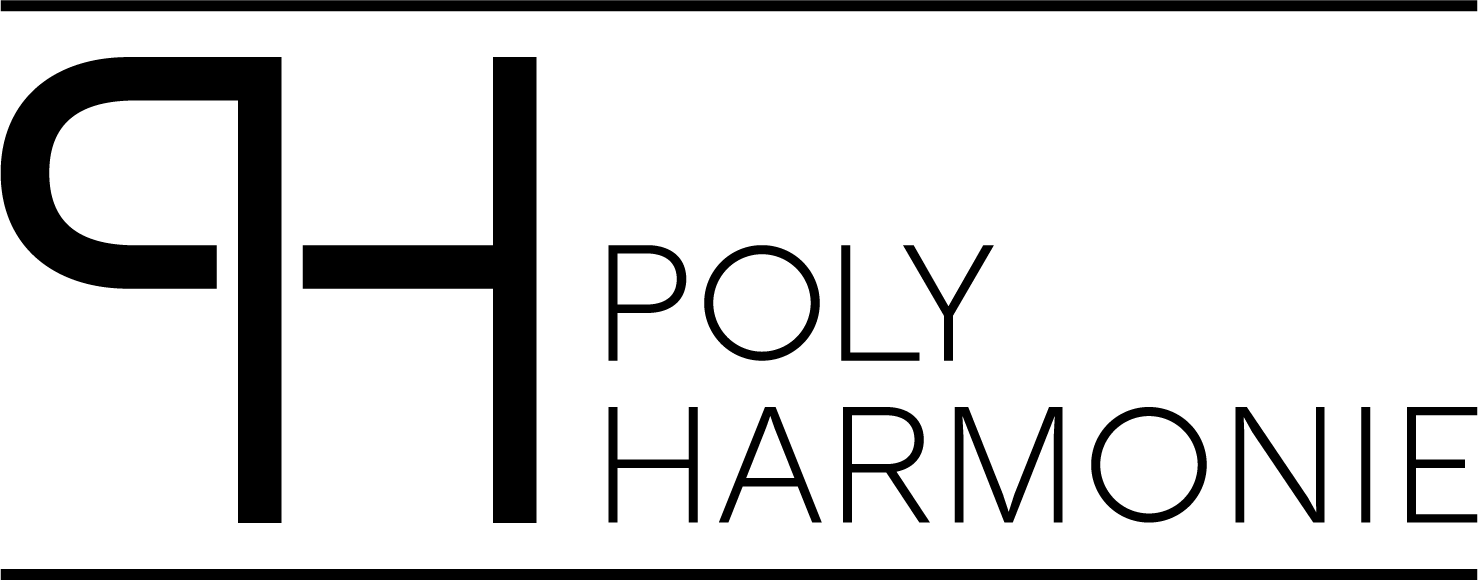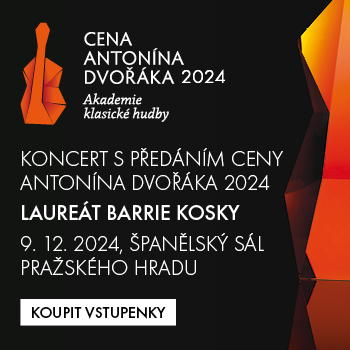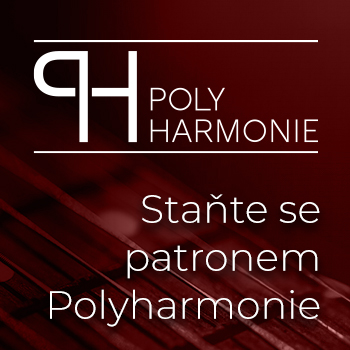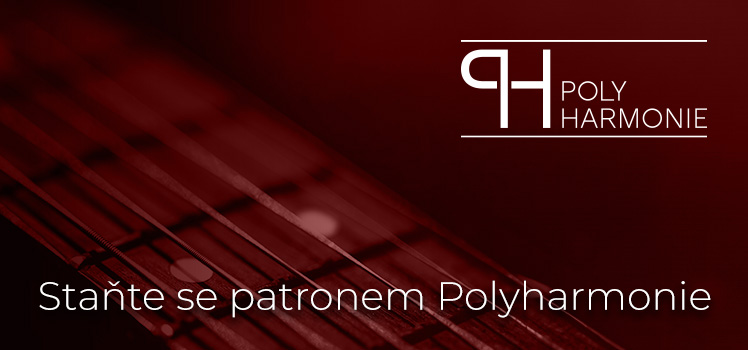“I love the pure beauty & spirituality of Karl’s music; music without boundaries, loved by everyone, and totally democratic.” Marat Bisengaliev, a Kazakh violinist and conductor
On July 17, 2024, Württemberg Philharmonic of Reutlingen together with an international choir KONEKTO, under the baton of Sir Karl Jenkins gave the German première of one of the author´s latest compositions, the oratorio One World, as part of the Festival of European Church Music in Schwäbish Gmünd. Here, in the Holy Cross Minster, Sir Karl Jenkins, one of the most famous and recognized living composers, received the European Church Music Prize 2024 from the hands of the Lord Mayor of the town Richard Arnold.
This prize, in German Preis der Europäische Kirchenmusik, has been awarded since 1999 to excellent composers and artists for their exceptional achievement in the field of sacred music. A Czech composer Petr Eben was one of the first presented with the prize in 2001, followed by such renowned and highly appreciated names as Krzysztof Penderecki (2003), Arvo Pärt (2005), Sir John Tavener (2013) and Sir John Rutter (2019).

Sir Karl receiving the prize from the hands of Richard Arnold, the Mayor of the town.
For his merits in composition and the crossing of musical borders, Sir Karl Jenkins was elevated to a knighthood in 2015. He is one of the most performed living composers worldwide. „The Armed Man: A Mass for Peace“, commissioned in 1999 by the Royal Armouries and Classic FM to mark the millennium, has been performed around 3,000 times in 50 countries since its publication. In 2023, it broke chart records by reaching more than 1,000 weeks in the UK Official Classical Artists Album Chart.
The oratorio „The Armed Man: A Mass for Peace“ is based on the 15th century French poem L’homme arme and is a reflection on the horror of war and its consequences, as Sir Karl comments: „I’m sad to say there has been no let-up in war and conflict since I dedicated the piece to the victims of Kosovo, but we continue to make music in remembrance of those who have perished and in the hope that humanity can find a way to heal.“1
The very strong appeal for humanity and the healing of our broken, fragmented planet is thoughtfully embedded in the message of the oratorio One World, which undoubtedly has all the qualities of Jenkins’s previous works and all the ingredients to become just as successful as The Armed Man. „In 2020, hoping to compose a new large-scale work, while living through difficult times and struggling for an idea, I quickly realised that the answer was all around me: the increasing chaos and madness that was enveloping the world, in many and various forms; climate change; populist mendacious right-wing governments; despots; the pandemic. I considered whether the work would still be relevant three years hence. The situation is now even worse, with war in Europe and financial turmoil and instability everywhere,“ writes Sir Karl in the preface to the score.2

The cover of One World.
Sir Karl Jenkins doesn’t stop at his noble goal for world peace. Apart from war, as many times before, he continues to address the most urgent and relevant anguish of today’s world: the destroyed planet, abuse of power, repressive regimes, disregard for basic human rights, fake news disparaging the truth. One World, an oratorio for soloists, choir and orchestra, „heralds a vision of a peaceful and egalitarian planet that treats nature and ecological issues with respect and where human rights are universal. Where truth is truth and news is never ‚fake‘, where leaders do not lie, transparency is a given and all faiths live together in peace. There is neither famine nor war.“3
As is encapsulated in the Hebrew words of one of the movements „Tikkun Olam“, „Repair the world“ seems to be the strong message sent to the world by this piece of music. Jenkins dedicates it to UNESCO in recognition and appreciation of more than 75 years of commitment to dialogue, peace and reconciliation through culture among the nations of the world.
One World was premièred under the baton of the composer at the Brucknerhaus in Linz on 19th November 2023, with the joint forces of the commissioning World Choir for Peace and the World Orchestra for Peace, founded by Sir Georg Solti and Charles Kaye in 1995, and thanks to the steadfast support of this project from Charles Kaye, choir leaders Nicol Matt, Alexander Koller, and others. HardChor and Musischen Borg Linz, the Stay at Home Choir, the singers of the Austrian Federal Youth Choirs and a massed choir with 128 singers from around the world, soloists Ruby Hughes (soprano), Kathryn Rudge (mezzo soprano) and Roderick Williams (baritone) came together too to perform at this world première, joined by 263 virtual choir singers connected from more than 40 countries.4

Performance of the world première in Linz, Austria.
For the German première, the choir was also „designed“ and organised in a specific way. The professional part of the KONEKTO Choir, called „the Pros“, comprising of 32 accomplished professionals, signers, conductors and composers, originating from over 15 nations, was now connected with another group of 41 singers, called the „Kollektives“, arriving from all corners of the world, all dedicated to doing their best in the performance. The word „konekto“, in Esperanto „connected“, symbolically represents the values shared among singers themselves: deep community engagement, cross-cultural understanding and diversity. The choir endeavours to push the boundaries of choral artistry further while maintaining the highest artistic standards in terms of creativity and the quality of choral singing.
What was the motivation of the organisers to put together a choir in this way? Artistic director of the choir, Alexander Koller explains: „I am happy thinking about the wonderful opportunity to perform such a tremendous composition with many musicians searching for Love, Peace and Hope in music. What a blast! And above all there is a composer who delivers us with the perfect piece of music: Sir Karl Jenkins with One world. Fantastic. And this is exactly the reason why I am top motivated to bring singing people together.“
There are, however, some personal reasons too: „My personal reason is definitely the musical friendship with Sir Karl. I truly believe in his music and in its meaning. His music is sung all over the world and people feel good while singing or hearing it. There are some minutes where you can forget the troubles of our world and find motivation to live on and make the world a better place. What a chance to do so through music. I also like to work with Sir Karl, feeling his power and wisdom through his shining eyes. And I like it when he moves his lips and it feels as if his cool moustache was dancing to his music, lovely. He is such an inspiration for his fans and the people performing his music all over the globe.“

The KONEKTO organising team, from left to right: Helen Ostafew, Melanie Dirbach, Alexander Koller and Elisabeth Parsons.
Quite a large number of people coming to join the KONEKTO Kollektive part of the choir are members of the international Stay at Home Choir, founded by Tori Longdon and Jamie Wright in London during the times of the coronavirus lockdown as a virtual choir. To meet and work with them in person is another strong motivation and a reason for singers to come. The times after COVID-19 only deepened the bond between the choir members as new opportunities to sing together both online and in person have emerged.
Here are the words of Mats Löf, one of the tenor singers and a retired IT, Chemistry and Physics teacher from Finland, now providing IT support for the blind and visually impaired people in his region: „I love Sir Karl’s music, and I love the Stay at Home Choir community and their values. I wanted to meet my friends from Linz and the Stay at Home Choir projects once again in person. I enjoy learning more and more about music, about singing, and even if my voice is no longer as young as I feel, I strive to keep it in shape for as long as I can. I can’t paint, I can´t dance, but I can sing. So why shouldn’t I express myself and my feelings in the best way I can? I sing because I love to sing. Singing makes me happy. I sing to know that I’m not alone.“
Jade Victoria, one of the female tenor voices in the choir, from Newcastle in North East England, works as a People Coach, helping managers to be more effective in their jobs. She also witnesses the importance of singing and the existence of singing communities around her:
„I grew up in a family that always appreciated music. Music is something that was always around as I was growing up. I enjoy the feeling that it gives me when I sing and perform, I find it rewarding. I like the social aspect of it particularly with choral singing with other people. I enjoy having the opportunity to sing with like-minded people, meeting new people through choir and having the opportunity to sing a lot of different music and learn about different music.
Choir singing has been pretty much part of my whole life. I have been singing ever since the age of 8, joining every possible school choir and chamber ensemble there. I took a little break after finishing university because I couldn’t find a lot of accessible choirs for adults and a lot of them were very very expensive or required a lot of commitment that I just didn’t have time for. Eventually I found my community choir.
I started joining some virtual choirs, doing virtual projects and found the Stay at Home Choir through my mum, so I got involved there. Then my mum took part in the OneWorld première in Linz and had an amazing time there, so when the opportunity came up to take part in this project, I thought I would very much like to do that.
It was a nice opportunity to do something different. The community choir that I’m in does music that’s generally quite easy, most of the people in my choir don´t read music and so we do a lot without scores, we do a lot of learning by ear. To sing with Sir Karl Jenkins was an opportunity that I couldn´t turn down, I could sing something more challenging and do a more professional kind of singing.“
Despite their very full working schedules, the founders of the Stay at Home Choir travelled from the United Kingdom to support the choir’s European premiere. Tori Longdon, currently Associate Chorus Director of the London Philharmonic Choir, talks about how she manages to „squeeze“ all this work in. „I think the ultimate answer is that we prioritise the things we love and Jamie and I both love these kinds of international opportunities that bring people together. We love the Stay at Home Choir community and we want to do whatever we can to support it and to keep it going and this is exactly that.“
Tori explains what are the most important qualities and values she strives for in her work.
„Values for the Stay at Home Choir have always been quality, community and accessibility and the more we´ve had those for the best part of the past five years of running the organisation, and the longer it goes on, the more I realise that those are just our values, that they are my values and they are Jamie´s values. They run through every aspect of our musical work, not just the Stay at Home Choir work. Having those values close to our heart makes it easy for us to work out what we prioritise and what we follow. Ultimately it enriches our lives and I suppose we will keep doing that, keep on following opportunities which are fantastic for the community, accessibility, but also, you know, spread high quality singing opportunities across the world. Looking forward to coming to Germany and, my gosh, it is so soon!“
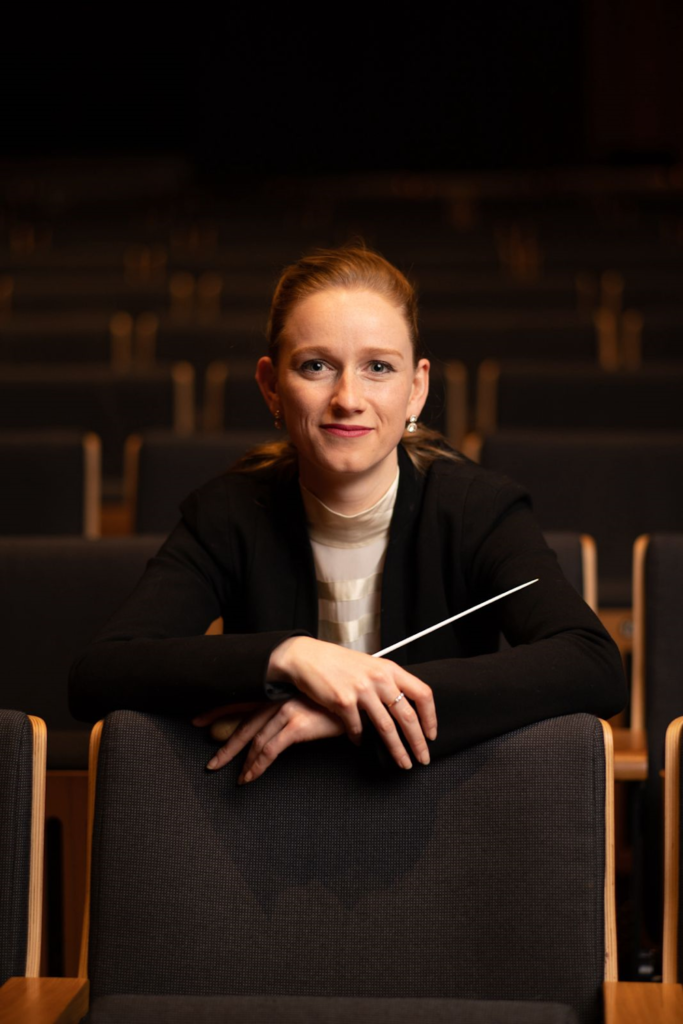
Tori Longdon.
On Monday the 15th July, in the studios of Württemberg Philharmonic in Reutlingen the KONEKTO Kollektive choir members are slowly gathering for their first rehearsal. Some of them already know each other well, some only thanks to previous online meetings. Stories of postponed or cancelled flights, lost luggage and other travelling difficulties can be overheard, but excitement and expectation is in the air, everyone ready and focused on the events of the coming days. The first rehearsal meetings continue in the boiling temperatures till late evening. It’s not just the score, but – and maybe even more importantly – connectedness between the choir members that needs to be nurtured.
Tuesday comes after a heavy night-time storm. The air has finally freshened up. The level of expectation rises with the arrival of Sir Karl Jenkins. The youngest members of the choir straight away take their BeReal photos with the composer in the background, others don’t mind standing in a queue just to get their scores signed by him. Some people have brought over many of their various scores – most of them showing signs of being well used – despite baggage restrictions on the flights. Time is passing peacefully, a great amount of pizza ordered for a break certainly helps. Both singers and orchestra players enjoy their time together, sitting, eating and chatting in an apple orchard surrounding the Philharmonic premises. The branches of old apple trees laden with fruit lightly touch the flowering meadow beneath. Suddenly you get the feeling of being connected with an unexpectedly old heritage, passed on by previous generations of those who planted the trees. All the more surprising, given the modernity of the Philharmonic studios building.
Day Two brings yet another pleasant surprise. After quite a demanding morning of practice and an afternoon rehearsal with the Philharmonic orchestra and Sir Karl Jenkins himself, it becomes clear that the choir is more than ready to stand up to this challenge.
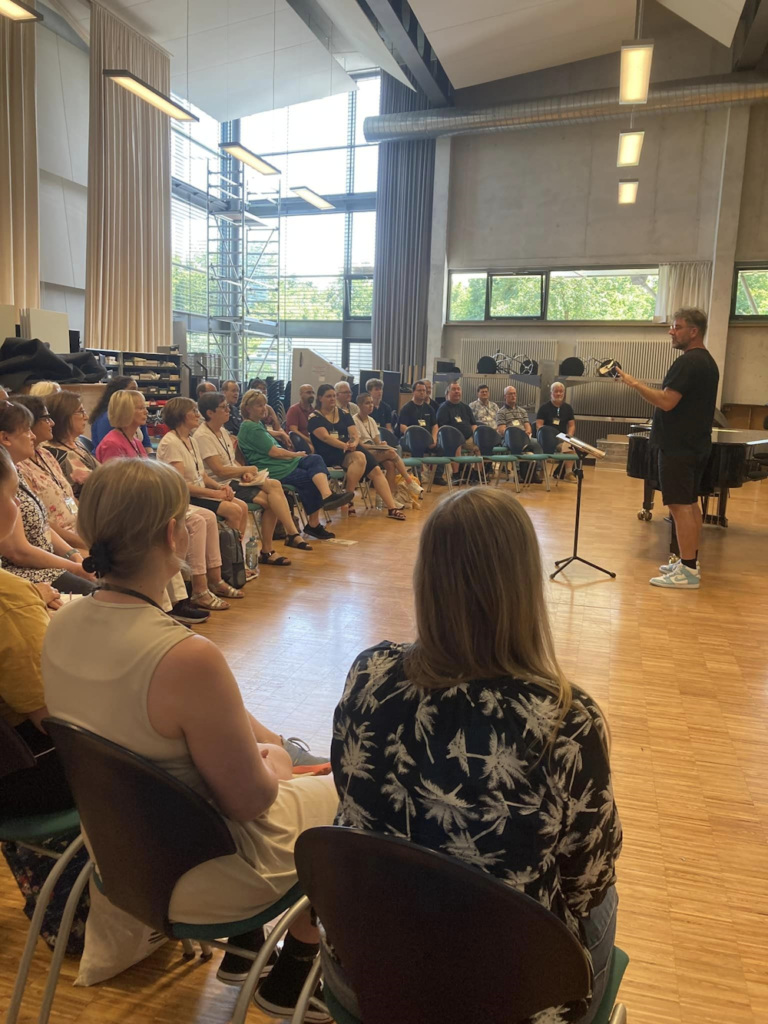
The KONEKTO Kollektive Choir and Alexander Koller in the Philharmonic studios in Reutlingen during the rehearsal.
The setting of the final concert day awaits in Schwäbisch Gmünd, where, according to the town motto, „Heaven and Earth meet“. The concert is taking place in the town’s most important church, Heilig-Kreuz-Münster (the Holy Cross Minster), a gothic church built in the 14th century, connected with Peter Parler, a German-Bohemian architect and sculptor, one of the most prominent and influential craftsmen of the Middle Ages. The magnificence of the place is reassuring, it is a place where great things have been happening for centuries, but at the same time there are moments of concern as the choir members all wish to live up to the place and the occasion.
After yet another set of warm-ups and rehearsals with brief pauses, the time comes for the choir to dress in white. The final photos on the red carpet in front of the local Prediger Kulturzentrum, final advice from the choir leaders, final words of encouragement, smiles, embraces and support between all choir members are shared. Entering a side door, the choir members are lining up in the precise order needed to get on stage. „Suddenly, we realised that there were a lot of people in that building and that making this a success depended on the human body, brain and spirit alone. As we took to the stage and the first chords of the piece started, our training kicked in and now we were able to not just follow the score but to sing it, to enjoy singing it and to hit notes we thought were beyond us. Sir Karl Jenkins appeared in a reassuringly relaxed and confident fashion. His eyebrows, the waggle of his moustache and a twinkle in his eyes somehow seemed to communicate all we needed to know. And suddenly we had got to the end of the piece and people actually started applauding, for a long time. What a great feeling!“ one of the choir members remarks movingly.
As a reviewer Bettina Burchard later wrote for the German newspaper Rems-Zeitung,„the choir created an emotional depth that fascinated and carried away the Gmünder audience. Behind the top-class musicians of the Württemberg Philharmonic, which is also made up of international members and whose founding idea is also to create social cohesion through the power of music, the result on Wednesday evening was a wonderful picture and a listening experience on all levels. The special voices of the soloists … floated through the nave and finally merged with the choir.“5
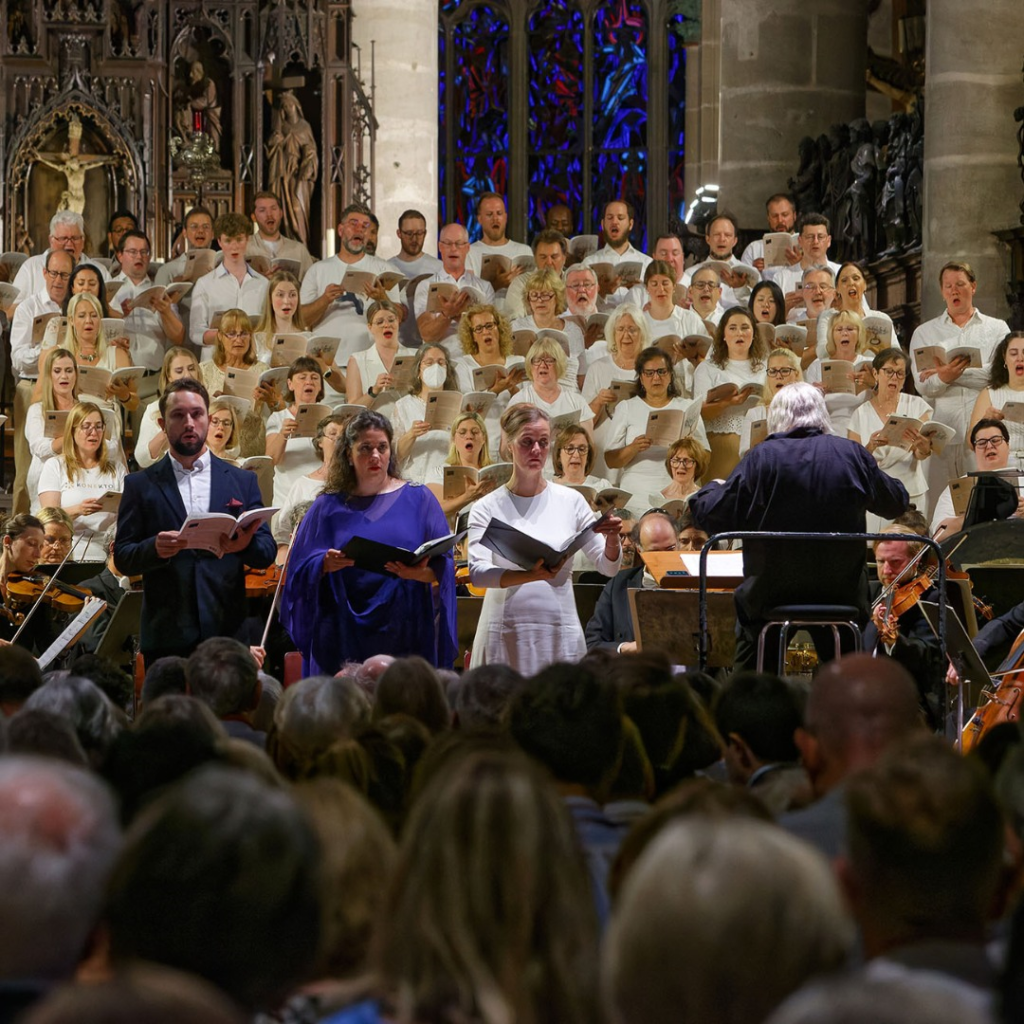
The KONEKTO choir and Philharmonic orchestra during the performance in the Holy-Cross Minster in Schwäbisch Gmünd, Germany.
Behind every musical ensemble and every successful performance is a dedicated team working tirelessly behind the scenes, so there are some important names from the KONEKTO organising team which have not been mentioned yet, and they are Elizabeth Parsons, Helen Ostafew and Melanie Dirbach. „Well, while there haven’t been any major challenges, it has been an exciting journey organising the singers from across the world. Getting to know them and already feeling like a community as we embark on this amazing project has been incredibly rewarding. Working on such an enlightening and inspirational piece of music with a living composer has truly been an honour. This experience has brought us together in ways we couldn’t have imagined, and we are thrilled to see it all come to life,“ explains Elisabeth Parsons.
Let’s conclude with the words of Catherine James, one of the youngest singers in the choir, whose wish is to study medicine, though her musical career so far has been quite impressive. She’s been a chorister in Guildford Cathedral since childhood, attending the Royal Academy of Music Junior Department for vocal tuition. A finalist of the BBC Young Chorister of the Year Competition 2019, she has performed and sung with the cast of the Royal Opera House, National Youth Choir of Great Britain and the London Philharmonic Choir among others: „Singing brings me so much joy and really makes me feel alive! It was such a wonderful opportunity to be part of a global choir, meet and collaborate with international musicians and professionals. I have always loved the music of Sir Karl Jenkins so was very excited to sing at a German première!“
So, even though all the participants of the One World project, people of varied professions from many different nations, backgrounds and communities, have now been „scattered to all corners of the world“, to quote the words from the second movement of this composition Let’s Go! (The Tower of Babel), it’s clear the bond between them is even stronger now, and that bond is their shared love of choral music and their desire to support communities they live in all over the world with the power of music. Because, after all, „we gaze at the same stars, we share the same sky, the same universe engages us“.6
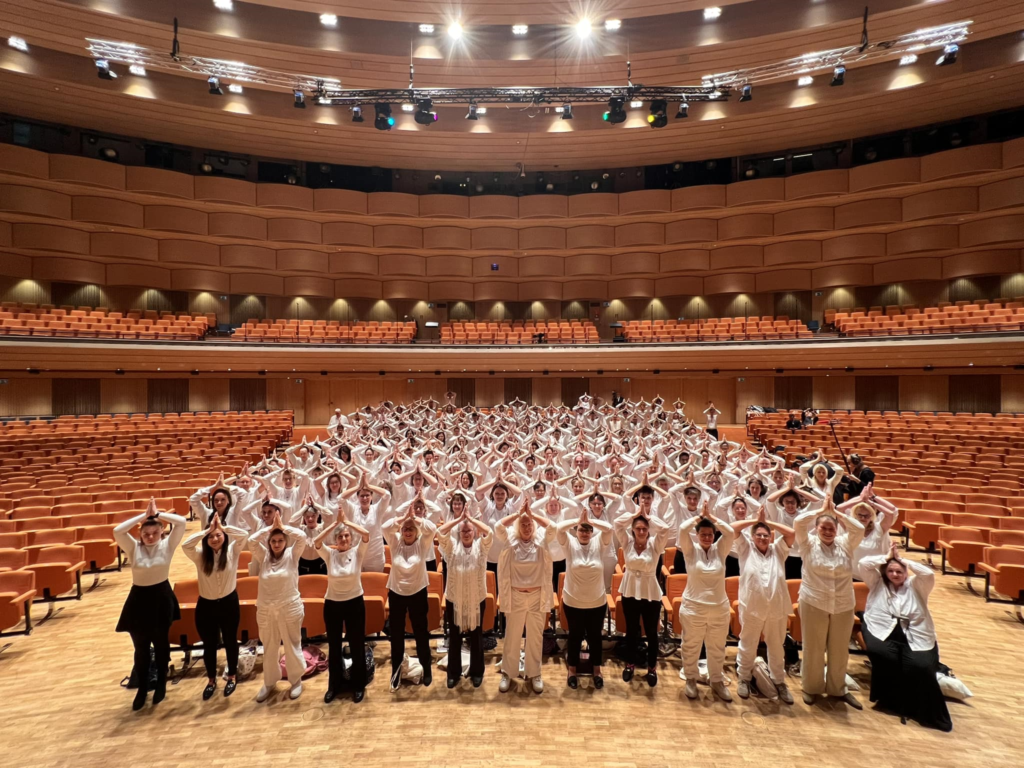
Preparing for Savitur in Brucknerhaus Linz.
[1] Bedigan, M. (2023, May 19). Composer who went viral at coronation breaks UK classical chart records. The Standard.
https://www.standard.co.uk/culture/music/prince-of-wales-duchess-charles-sussex-welsh-b1082479.html
2Introduction and Synopsis, p. 5. In: Jenkins, K. (2023). One World Vocal Score. Boosey & Hawkes Music Publishers Ltd. ISBN 978-1-78454-819-3.
3Ibid. p. 5.
4The recording of the concert is available online at https://www.youtube.com/live/4ZG3ublh6zY?feature=shared
5Burchard, B. (2024, July 19). EKM: Praisträgerkonzert mit Sir Karl Jenkins. Rems-Zeitung. https://www.remszeitung.de/kultur/regional/ekm-preistraegerkonzert-mit-sir-karl-jenkins-Q2IVK2G575CUPEIRI3E4ZIFA3I.html?outputType=valid_amp&fbclid=IwY2xjawEWJJRleHRuA2FlbQIxMQABHYhyKT0xl3y7dDQPP6daQAGfSFYhGXEVOA38un_3JJRmdwmnpBj3dnzL_A_aem_59ZhsWz13vlsa3KTJtYJkQ
6Text from the third movement Unus Mundus, part of the Roman Governor Symmachus speech to the Christians (c400 CE).
BIOs and PROFILES
Sir Karl Jenkins is, globally, one of the most prolific, popular and performed living composers. In 2023 his music was played at the Coronation of King Charles III, The Armed Man: A Mass for Peace gained the unique status of having achieved “1000 Weeks” in the UK Classical chart, he was ranked fourth in the Classic FM Hall of Fame, which is the highest position for a living composer, and fifth in a list of Great British Classics.
Karl Jenkins read music at Cardiff University and the Royal Academy of Music, London. Resisting categorization, his style and integrity have transcended musical boundaries: jazz, jazz fusion, award-winning soundtracks for movies and documentaries, recording sessions with Elton John, George Harrison and Andrew Lloyd Webber among others.
Together with his classical, and yet ‘cross-genre’ phenomenon Adiemus (1995), commissioned for a television commercial, which topped the classical charts around the globe and brought him to the world’s attention, his best-known work is The Armed Man: A Mass for Peace (2000). This piece has received 3000 performances around the globe since its millennium premiere. Memorable performances include Berlin with the World Orchestra for Peace and a choir of 2000 singers from 30 countries, commemorating 100 years since the end of World War I.
The two works were pivotal to his future direction over 30 years, as he continued to progress ideas seen in those pieces; peace, multiculturalism and the inclusion of global instrumentation and text, often set alongside the traditional sacred Latin: Requiem, Stabat Mater, Gloria, Miserere, The Peacemakers.
Jenkins has earned 17 gold and platinum discs for his output. Alongside his solo recordings, he has written music for Sir Bryn Terfel, Dame Kiri Te Kanawa, Rolando Villazon, Jess Gillam and the London Symphony Orchestra. His reach as a composer is global, with concerts at The Royal Albert Hall, Zaryadye Hall Moscow, Carnegie Hall, The Forbidden City Concert Hall Beijing and Buckingham Palace.
Karl Jenkins was awarded a Knighthood in the 2015 Queen’s Birthday Honours and his autobiography Still with the Music was published by Elliott & Thompson. His music is published exclusively by Boosey & Hawkes and he is a Decca Records recording artist. Decca bestowed upon him the unprecedented distinction of a Lifetime Signing deal, the first time the label has made such a commitment to any artist.
His most recent work is One World, conducted by the composer and performed by the World Choir for Peace and the World Orchestra for Peace. It was released by Decca Records in summer 2023, going straight to number one in the UK Classical chart and received its concert premiere at the Brucknerhaus in Linz in November 2023. His recent saxophone concerto Stravaganza was premiered by Jess Gillam and the Deutschen Symphonie-Orchester at the Berlin Philharmonie in June 2023.
Alexander Koller has dedicated his life to the artistry of choral conducting, singing and music education. Ever since completing his studies at the University of Music and Performing Arts in Vienna and at the Private University Linz, he has never ceased developing his skills and professional knowledge as a choir and orchestra conductor, singer and a music educator.
Alexander works full-time as a teacher of music education, singing, and as the director of „Vocalmania“ at the BORG Linz. From 2008 to 2012, he trained choirmasters as part of the Upper Austrian state music school’s choirmaster training programme. He is vice regional choir director in the Upper Austrian Choir Association and is therefore jointly responsible with Kurt Dlouhy for the choral and musical direction of the 22,000 singers in Upper Austria.
Since 2007, Alexander Koller has been leading the vocal ensemble Hard-Chor, a young group of ambitious singers, who repeatedly combine traditional choral music with modern elements and techniques of popular music to create new sound impressions. With Hard-Chor, Alexander achieved many awards at international choir festivals in Estonia and Austria, and represented his country at the famous European Song Contest for Choirs in Riga, Latvia, with Elina Garanca and John Rutter among jury members and Eric Whitacre as the concert presenter.
Since January 2015, Alexander Koller has directed the Linz Singakademie, which was founded as the Sängerbund Frohsinn in 1845 and has performed with renowned musicians and composers such as Anton Bruckner, Paul Hindemith and Balduin Sulzer. As a conductor, Alexander Koller has already worked with the Bruckner Orchestra Linz and other orchestras in Sankt Florian and Lambach.
Alexander is also active as a musician within and beyond Austria’s borders, he has been a passionate singer and soloist, collaborating with many chamber ensembles and choirs worldwide. Numerous concerts have taken him to several European countries, the USA and Asia. Workshops and masterclasses with Jordi Savall, Frieder Bernius, Gunnar Eriksson, Bobby McFerrin and many others further enrich his musical interests.
Fascinated by the pure, harmonious beauty of the human voice, Alexander Koller passionately advocates the exploration of contemporary choral repertoire, embracing its intricate nuances. His dedication captivates younger generations, inspiring within them a profound appreciation for the art of vocal music.
Victoria ‚Tori‘ Longdon studied choral conducting at the Royal Academy of Music. She is now the Associate Chorus Director for the London Philharmonic Choir, and the Principal Conductor of the Covent Garden Chorus. She coached the choirs for the Coronation Concert of King Charles III at Windsor Castle in May 2023.
Tori is the co-founder of the Stay At Home Choir, an international community of more than 29,000 choral singers which she leads together with Swingles baritone Jamie Wright. Professional choirs under her direction have sung in venues such as Wembley Arena, St. John’s Smith Square and Southwark Cathedral and performed for the Duke and Duchess of Cambridge and President Xi Jinping of China.
She travels the world leading workshops, adjudicating competitions and working with conductors and choral singers. Victoria has appeared on the BBC as a conductor and adjudicator for Songs of Praise and a judge on two series of BBC2’s ‚The Choir‘ with Gareth Malone. She also works with BBC Three Counties Radio and ClassicFM. As a broadcaster, she has interviewed some of classical music’s most famous names, including Marin Alsop, John Rutter, Sir Karl Jenkins, Sofi Jeannin and Christopher Tin.
She is a passionate educator and advocate for classical music, and was recently shortlisted for a ‚Woman Of The Future‘ award for her work in the field.
Jamie Wright is Baritone & Vocal Percussionist for the 5-time Grammy award winning group The Swingles and co-founder of the Stay at Home Choir with conductor Tori Longdon.
He studied Music at the University of York and undertook the vocal performance Masters programme at the Royal Academy of Music. After graduation he worked closely with Gareth Malone as an arranger and vocal coach for his shows, going on to join Gareth in his choir ‚Voices‘ for a UK tour and subsequent recordings.
As a singer Jamie has performed at the BBC Proms, Shakespeare’s Globe, and as a soloist at The Barbican for The Britten Sinfonia Voices, and sings at the Tower of London Chapel Royal. He has appeared on numerous film soundtracks and TV recordings with The Eric Whitacre Singers, London Voices and Audio Network.
As an enthusiastic and engaging educator, he delivers a wide range of workshops for all ages with many renowned music institutions, exploring a wealth of genres and beatboxing, and has developed multiple music teaching and learning apps, a music theory app Muso among others. His combination of musicianship, groove and boundless energy is contagious and inspiring.
Stay at Home Choir
The Stay At Home Choir is a global singing community using digital technology to bring music lovers together. To date the Stay At Home Choir has involved more than 29,000 singers around the world in inspiring online singing projects with artists such as Marin Alsop, Sir Karl Jenkins, Gareth Malone, John Rutter, Morten Lauridsen, Christopher Tin, The King’s Singers, I Fagiolini, VOCES8, The Swingles, The Royal Philharmonic Orchestra and The Berlin Philharmonic.
Stay At Home Choir members have access to a variety of opportunities, from album and video recordings to digital access to live events. Learning sessions are inclusive, supporting members to improve their singing skills, confidence, and choral knowledge whatever their previous experience. The members are encouraged to discover their creativity and connect with like-minded music lovers through the universal language of music, innovative teaching methods and latest technology. Breaking down barriers to make choral music accessible and affordable for everyone are the grounding principles of the Stay at Home Choir.
The choir, led by its founders Tori Longdon and Jamie Wright, received the first Royal Philharmonic Society Inspiration Award in 2021.
